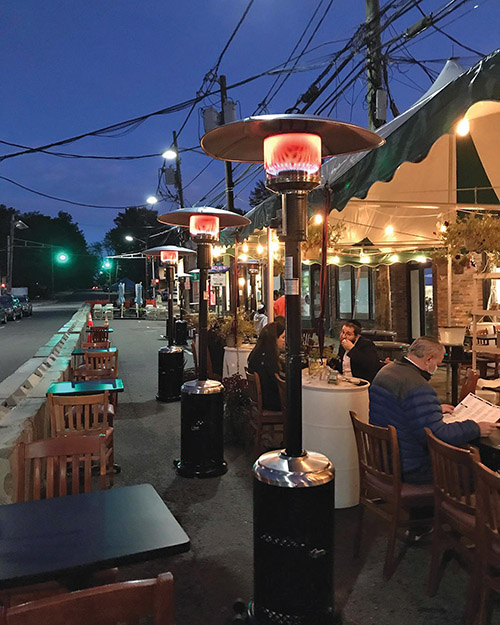
One of the bright spots of the precautions taken during the pandemic has been watching the creativity and resilience of our communities’ kosher restaurants. A small joy of suburban religious life is the availability of tasty and affordable kosher cuisine; we’re heartened that our restaurants have risen to the challenges of the COVID-19 era and found ways to continue to safely welcome customers and offer dining opportunities.
We know, though, that the challenges to our restaurants will only get bigger as winter approaches and cold weather settles in. With hopes that our kosher eateries all survive the enhanced obstacles, and to learn what plans they have to handle dropping temperatures, The Jewish Link reached out to a few restaurants to ask what strategies they were putting in place.
Noam Sokolow, owner of Noah’s Ark in Teaneck, shared that the restaurant has three options for customers. First and foremost, they have a heated, covered tent that allows for comfortable outdoor dining. Their spacious restaurant, which in ordinary times seats 200, can now seat 50 people “with lots of room.” And they also offer takeout and delivery throughout Bergen County (delivery to other areas as well, with large orders).
Jordy Rivas, manager at The Humble Toast in Teaneck, stated that they are waiting for approval from the town for a tent with heaters that will seat 20-25 customers. They will also offer indoor seating, but with limited capacity—one large party (eight in total) or two small parties. They offer takeout and delivery as well.
Michael Garber, mashgiach and front-end manager at The Bridge Restaurant in Highland Park, spoke about the large outdoor structure they’ve already set up and a tall heating unit they received from the Main Street Highland Park organization.
Paul Goldman, owner of Park Place in Highland Park, reported that “takeout has always been a big part of our business,” estimating that it brought in 50% of revenue in regular times. He has not offered outdoor dining, nor does he plan to do so. Goldman recently created a “Park Place Package” of menu options designed to enable customers to create an enhanced kiddush at home; many customers have told him that they use these items for their Shabbat meals and enjoy the additions. Goldman intends to build on this approach and also create combinations with special pricing for weekday nights.
Michael Kornblum, owner of Sushiana in Highland Park, has already been offering special pricing on different combinations of items on their menu and plans to expand these offers. Sushiana uses Facebook and Twitter to announce these deals, as well as a subscription-based email list on their website, sushiana.com.
Reuben Rahmani, co-owner of Reuben’s Glatt Spot in West Orange, said that the restaurant has very limited indoor seating. They have been fortunate to cater 10 or more smachot during the pandemic to date, all done in a COVID-safe manner. They plan to promote their takeout options and pursue more catering, serving groups at country clubs, hotels, shuls and parties in large backyards.
Coby Adler, owner of Super Duper Bagels in Livingston, said they plan to take down their outdoor tent shortly and will focus more on takeout and delivery. They also offer catering for smachot, via takeout plates and platters, and hope to see a growth in that area of the business.
Tal Robinson, owner of Rye Deli in Springfield, said that they have no sit down options and only offer takeout, so the change in seasons will not prompt any major changes. They may place more advertising and explore expanding their delivery area.
Shneor, the owner of Glatt Fusion in West Orange, noted that his business has always been primarily takeout, so the current circumstances have not changed things very much for them. They will “do their best” during the cold weather.
Mendy Kornbluth, owner of Fish Grill in Howell (outside Lakewood), reported that they are focusing on the holiday season and looking to book catering orders for office parties and smachot. They will also add more soups to their menu. Over the summer and fall they had a large outside tent for dining but will not do so in the winter; the restaurant offers limited indoor seating, currently at 25% of their usual capacity, per state mandate.
Nachman Joseph, manager of Ottimo Café in Lakewood, said that the local health department has allowed the restaurant to seat 30 patrons at a time, with appropriate social distancing and staff wearing masks, and they plan to continue to do so. They have not offered outside seating, due to the space constraints of the strip mall where they are located.
By Harry Glazer









